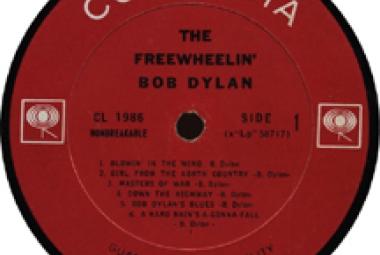"When the Ship Comes In" is a folk music song by Bob Dylan, released on his third album, The Times They Are a-Changin', in 1964. Joan Baez states in the documentary film No Direction Home that the song was, more or less, inspired by a hotel clerk who refused to allow Dylan a room due to his "unwashed" appearance (he was not famous outside of the folk movement at this time). The song then grew into a sprawling epic allegory about vanquishing the oppressive "powers that be". Another inspiration was the Bertolt Brecht/Kurt Weill song, "Pirate Jenny". Shortly after Dylan wrote the song, he and Baez performed it together at the March on Washington on August 28, 1963. Dylan later performed the song at Carnegie Hall on October 26, 1963; this performance is recorded on The Bootleg Series Vol. 7: No Direction Home: The Soundtrack (2005). Dylan performed the song during Live Aid on July 13, 1985, accompanied by Keith Richards and Ron Wood of the Rolling Stones. (More from Wikipedia)
The structure of the song was inspired – by way of the cultural tastes of Dylan's former girlfriend Suze Rotolo – by a Bertolt Brecht/Kurt Weill song "Jenny the Pirate Bride"; the song comes from their play, The Threepenny Opera. The song is closely associated with Weill's wife, the Austrian singer Lotte Lenya, and her breakout role was in a 1928 production of The Threepenny Opera. The most famous song from that play is "Mack the Knife", which was an unexpectedly huge hit for Bobby Darin in 1959. The lyrics in his version of the song even reference "Miss Lotte Lenya". Lenya is best known to Americans for her role as the villainous Rosa Klebb in the 1963 James Bond movie, From Russia with Love.
On one of my beloved Bob Dylan bootleg albums, I have a live performance of "When the Ship Comes In" – one Internet source says that it was in Carnegie Hall – that has this memorable introduction: "I wanna sing one song here recognizing that there are Goliath's nowadays. And, er, people don't realize just who the Goliath's are, but in olden days Goliath was slayed and everybody looks back nowadays and sees how Goliath was slain. Nowadays there are crueler Goliath's who do crueler, crueler things, but one day they're gonna be slain too. And people 2,000 years from now can look back and say, remember when Goliath the second was slain."
His next album, Another Side of Bob Dylan, is not devoid of his earlier musical styles either. Another Side also includes "Chimes of Freedom" that – like "When the Ship Comes In" – is rich with social commentary on the downtrodden and those who have been treated unfairly. However, to me, this is really the kind of song that Bob Dylan was singing throughout this period.
As to his Christian period, I have already mentioned the Biblical imagery in "When the Ship Comes In". The opening verse of the title track, "Highway 61 Revisited" on Highway 61 Revisited is a hip retelling of God's command that Abraham sacrifice his long-awaited son Isaac. One of the songs on his very first album, Bob Dylan is a traditional folk song called "Gospel Plow". So none of this is brand new either as I see it.
(May 2013)














